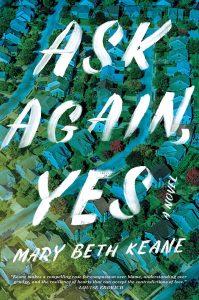 Published by Scribner 28 May 2019
Published by Scribner 28 May 2019
400pp, hardback, $27
Reviewed by Elsbeth Lindner
There’s a category of American literature – let’s call it quotidian smooth – that, at its best, offers a kind of soaring take on everyday life, laying a wise balm over the more or less ordinary events that occur in middle class homes, while penetrating the soft but rich psychology of its characters. One of the best of these, in recent years, was Matthew Thomas’s We Are Not Ourselves which explored a family history across decades, through the particular lens of dementia, but which raised wider issues too – heredity, housing, loyalty and the daily of business of wedded life. Not to mention the US favourite, redemption.
Mary Beth Keane’s third novel joins these ranks. It too takes the long view, assessing the vicissitudes of two families living in neighbouring houses in Gillam, a suburb twenty miles north of New York City. The Gleesons and the Stanhopes know each other before settling in Gillam. Francis Gleeson and Brian Stanhope met as rookie copies in the NYPD. Yet they are not entirely friends. Upright Frances holds back a little from his less centred colleague. Their wives differ too. Lena, mother to Francis’s three daughters, offers friendship to Anne Stanhope but is rebuffed. Anne is prickly, mercurial, shading, over time, into violence and unpredictability. Meanwhile Francis’s youngest child, Kate, and Anne’s son Peter have formed an undying friendship which will slide frictionlessly into star-crossed love.
Keane’s quiet capability embraces a three-generational plot, multiple character perspectives and some complicated topics, notably mental health and addiction. Her empathy extends easily to Anne who, after reaching a shattering crisis, is incarcerated in a secure facility. Anne’s struggle to regain control of herself and a degree of normalcy in her interactions with her family are one facet of the story. Another is Kate’s response to this challenge and how it feeds into to the amelioration of another threat. Meanwhile Francis and Lena are tackling major threats to their own union.
It’s a broad yet domestic canvas. The story springs from Anne’s – or Keane’s – belief that ‘the beginning of one’s life mattered the most, that life was top-heavy that way’.
Gentle but affecting, Keane’s novel delivers a mature version of a narrative likely to appeal widely. Love will weather vicissitudes. It doesn’t get more conventional, nor special, than that.
